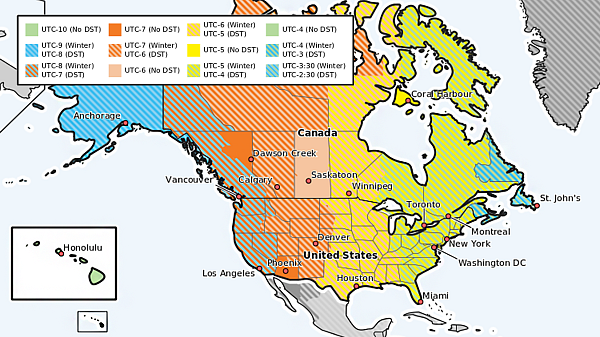USA & Canada: DST Ends on Nov 1, 2015
Daylight Saving Time (DST) ends and clocks are set back one hour in most of the US, Canada and Mexico's northern border cities on Sunday, November 1, 2015, at 02:00 (2 am) local time.


DST ends on Sun, Nov 1, 2015
©timeanddate.com
Clocks Fall Back One Hour
Clocks are set back from DST to Standard Time at 02:00 (2 am) to 01:00 (1 am) local time on the first Sunday in November, which in 2015 is November 1.
Lighter Mornings – Darker Nights
Sunrise will be about one hour earlier on Sunday morning, and the same goes for sunset, which will be an hour earlier than Saturday night.
Sunrise and Sunset in Your CityDST in Most of USA
The clock changes will affect many cities in the United States’ nine time zones and Canada’s 6 time zones.
Some parts of the USA, including Hawaii and Arizona, and some regions of Canada, do not observe DST and clocks there will not change.
Most parts of the USA and Canada will start DST again on Sunday, March 13, 2016.
Mexico DST Divided
A few northern Mexican border towns, like Tijuana and Juarez City (Ciudad Juárez), end DST along with the US & Canada.
Most of Mexico, however, ends DST one week earlier, on Sunday, October 25, 2015, when Europe's DST ends.
A few Mexican cities, like Hermosillo, do not observe DST at all.
No DST – USA
The following areas in the United States don't use DST and clocks will not change: Arizona (except Navajo Nation Community, which does use DST), Hawaii, American Samoa, Guam, Puerto Rico, and The United States Virgin Islands.
Changed Time Zone
People in Fort Nelson in Canada, will not be turning their clocks back this year, changing the time zone in the Northern Rockies Regional Municipality, British Columbia to MST.
Fort Nelson will use the same time zone as Fort St. John and Dawson Creek in neighboring Peace River Regional District.
No DST – Canada
The following areas in Canada don't use DST:
- Some regions in Québec, east of 63° west longitude (e.g. Blanc-Sablon)
- Most of Saskatchewan (except Denare Beach, and Creighton, which do use DST)
- Southampton Island in Nunavut
- Some areas in British Columbia (e.g. Dawson Creek and Creston)
- Some communities in Northwestern Ontario (e.g. Atikokan)